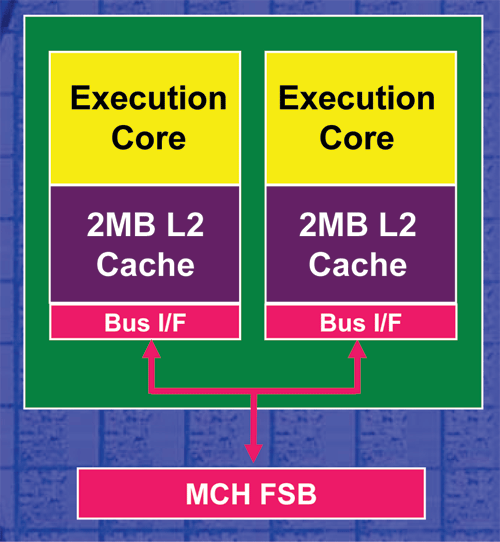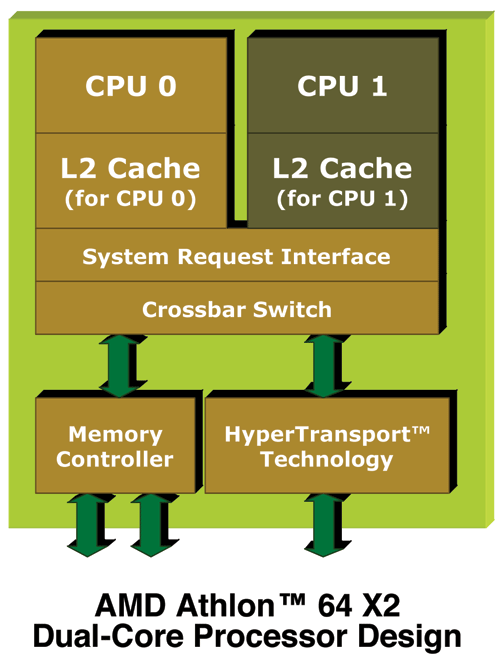AMD's dual core Opteron & Athlon 64 X2 - Server/Desktop Performance Preview
by Anand Lal Shimpi, Jason Clark & Ross Whitehead on April 21, 2005 9:25 AM EST- Posted in
- CPUs
A Look at AMD's Dual Core Architecture
Even Intel will admit that the architecture of the Pentium D is not the most desirable as is two Pentium 4 cores literally glued together. The two cores can barely be managed independently from a power consumption standpoint (they still share the same voltage and must run in the same power state) and all communication between cores must go over the external FSB. The diagram below should illustrate the latter point pretty well:
Intel's Pentium D dual core architecture
AMD's architecture is much more sophisticated, thanks to the K8 architecture's on-die North Bridge. While we normally only discuss the benefits of the K8's on-die memory controller, the on-die North Bridge is extremely important for dual core. Instead of having all communication between the cores go over an external FSB, each core will put its request on the System Request Queue (SRQ) and when resources are available, the request will be sent to the appropriate execution core - all without leaving the confines of the CPU's die. There are numerous benefits to AMD's implementation, and in heavily multithreaded/multitasking scenarios, it is possible for AMD to have a performance advantage over Intel just because of this implementation detail alone.

AMD's solution to the problem will come in the form of DDR2 and a new socket down the road, but for now there's no getting around the memory bandwidth limitations. Intel is actually in a better position from a memory bandwidth standpoint. At this point, their chipsets provide more memory bandwidth than what a single core needs with their dual channel DDR2-667 controller. The problem is that the Intel dual core CPUs still run on a 64-bit wide 800MHz FSB, which makes Intel's problem more of a FSB bandwidth limitation than a memory bandwidth limitation.
Backwards Compatibility
Intel's dual core Pentium D and Extreme Edition won't work in any previous motherboards, but as we mentioned at the start of this article, AMD has more bang. Here, the additional bang comes from the almost 100% backwards compatibility with single-core motherboards. We say "almost" because it's not totally perfect; here's the breakdown:- On the desktop, the Athlon 64 X2 series is fully compatible with all Socket-939 motherboards. All you need is a BIOS update and you're good to go.For desktop users, the ability to upgrade your current Socket-939 motherboards to support dual core in the future is a huge offer from AMD. While it may not please motherboard manufacturers to lengthen upgrade cycles like this, we have never seen a CPU manufacturer take care of their users like this before. Even during the Socket-A days when you didn't have to upgrade your motherboard, most users still did because of better chipsets. AMD's architectural decisions have made those days obsolete. The next generation of dual core processors will most likely need a new motherboard, but rest assured that you have a solid upgrade path if you have recently invested in a new Socket-939 desktop system or Socket-940.
- For workstations/servers, if you have a motherboard that supports the 90nm Opterons, then all you need is a BIOS update for dual core Opteron support. If the motherboard does not support 90nm Opterons then you are, unfortunately, out of luck.










144 Comments
View All Comments
saratoga - Thursday, April 21, 2005 - link
" The three main languages used with .NET are: C# (similar to C++), VB.NET (somewhat similar to VB), and J# (fairly close to JAVA). Whatever language in which you write your code, it is compiled into an intermediate language - CIL (Common Intermediate Language). It is then managed and executed by the CLR (Common Language Runtime)."
Waaah?
C# is not similar c++, its not even like it. Its dervived from MS's experience with Java, and its intended to replace J#, Java and J++. Finally the language which is similar to c++ is managed c++ which is generally listed as the other main .net language.
http://lab.msdn.microsoft.com/express/
Shintai - Thursday, April 21, 2005 - link
#80, #81Tell me how much faster a singlecore 4000+ is compared to a 3800+ and you see it´s less than 5% in average, mostly about 2%. Your X2 2.2Ghz 1MB cache will perform same or max 1-1½% faster than a singlecore 2.2Ghz 1MB cache in games. So 10% lower for is kinda bad for a CPU with higher rating. Memory wont help you that much, cept in a fantasy world.
And less take a game as example.
Halo:
127.7FPS with a 2.4Ghz 512KB cache singlecore.
119.4FPS with a 2.2Ghz 1MB cache dualcore.
And we all know they basicly have the same PR rating due to cache difference.
And the cheap singlecore here beats the more expensive, powerusing and hotter dualcore CPU with 7% faster speed.
So instead of paying 300$ for a CPU, you now pay 500$+, get worse gaming speeds, more heat, more powerusage....for what, waiting 2 years on game developers? Or some 64bit rescue magic that makes SMP for anything possible? It´s even worse for intel with their crappy prescotts, 3.2Ghz vs 3.8Ghz. Atleast AMD is close to the top CPU, but still abit away.
Real gamers will use singlecores the next 1-2 years.
Shintai - Thursday, April 21, 2005 - link
Forgot to add about physics engine etc. For that alone you can add a dummy dedicated chip on say..a GFX card for it for 5-10$ more that will do it 10x faster than any dualcore CPU we will see the rest of the year. Kinda like GFX cards are 10s of times faster than our CPUs for that purpose. Not like good o´days where we used the CPU to render 3D in games.The CPUs are getting more and more irrelevant in games. Just look how a CPu that performs worse in anything else as the Pentium M can own everything in gaming. Tho it lacks all the goodies the P4 and AMD64 got.
It makes one wonder what they actually develop CPUs after, since 95% is gaming, 5% workstation/servers and corporate PCs could work perfectly and more with a K5-K6/P2-P3.
Then we could also stay with some 100W or 200W PSU rather than a 400W, 500W or 700W.
cHodAXUK - Thursday, April 21, 2005 - link
make that 'performed to 91% of the fastest gaming cpu around'.cHodAXUK - Thursday, April 21, 2005 - link
#79 Are you smoking something? A dual core 4400+ running with slow server memory and timing plus no NCQ drive peformed within 91% of the fastest gaming chip around. Now the real X2 4400+ with get at least a 15% pefromance boost from faster memory timings and unregistered memory and that is before we even think about overclocking at all.Shintai - Thursday, April 21, 2005 - link
So what the tests show is like 64bit tests.Dualcores are completely useless the next 2+ years unless you use your PC as a workstation for CAD, photoshop and heavy encoding of movies.
And WinXP 64bit will be toy/useless the next 1-2years aswell, unless you use it for servers.
Hype, hype, hype...
In 2 years when these current intel and amd cores are outdated and we have pentium V/VI or M2/3 and K8/K9. Then we can benefit from it. But look back in the mirror. Those early AMD64 and those lowspeed Pentium 4 with 64bit wont really be used for 64bit. Because when we finally get a stable driverset and windows on windows enviroment. Then we will all be using Longhorn and nextgen CPUs.
Dualcores will be slower than singlecores in games for a LONG LONG time. And it will be MORE expensive. And utterly useless cept for bragging rights. Ask all those people using dual xeons, dual opterons today how much gaming benefit they have. Oh ye, but hey lets all make some lunatic assumption that i´m downloading with p2p at 100mbit so 1 CPU will be 100% loaded while im encoding a movie meanwhile. yes then you can play your game on CPU#2. But how often is that likely to happen anyway. And all those multitasking things will just cripple your HD anyway and kill the sweet heaven there.
It´s a wakeup call before you be the fools.
games for 64bit and dualcores ain´t even started yet. So they will have their 1-3years developmenttime before we see them on the market. And if it´s 1 year it´s usually a crapgame ;)
calinb - Thursday, April 21, 2005 - link
"Armed with the DivX 5.2.1 and the AutoGK front end for Gordian Knot..."AutoGK and Gordian Knot are front ends for several common aps, but AutoGK doesn't use Gordian Knot at all. AutoGK and Gordian Knot are completely Independent programs. len0x, the developer of AutoGK, is also a contributor to Gordian Knot development too. That's the connection.
calinb, DivX Forums Moderator
cHodAXUK - Thursday, April 21, 2005 - link
Hmm, it does seem that dual core with hyperthreading can be a real help and yet some times a real hinderance. Some benchmarks show it giving stellar performance and some show it slowing the cpu right down by swamping it. Some very hit and miss results for Intel's top dual core part there makes me wonder if it is really worth the extra money for something that can be so unreliable in certain situations.Zebo - Thursday, April 21, 2005 - link
even if i can't spell them.Zebo - Thursday, April 21, 2005 - link
Fish bitsWords mean things sorry you don't like them.
Cripple is true. The X2 is crippled in this test since it's not really and X2.
It's a "misrepresentation" of it's true abilities.
I was'nt bagging on Anand but highlithing what was said in the article then speculating of potential performance of the real X2 all things considered.
Sorry I did'nt attend PC walk on my tip toes class. I say what I mean and use accurate words.